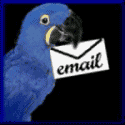We would like to take this opportunity to introduce ourselves to you as a Florida licensed, professional full-time breeder of exotic birds since 1978. You can scroll through the entire page or skip directly to any of the following topics that address our history, policies and procedures. |
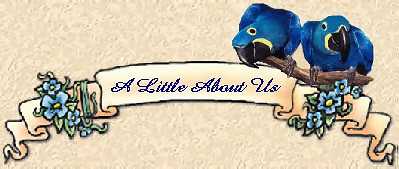
We would like to take this opportunity to introduce ourselves to you as a Florida licensed, professional full-time breeder of exotic birds since 1978. You can scroll through the entire page or skip directly to any of the following topics that address our history, policies and procedures. |

How did we begin? As with so many others enamoured and intrigued with the endearing beauty and personable nature of this world's feathered creatures, it began with a pet companion -- mine an Umbrella Cockatoo who we named Trixie. She had been captured from her natural habitat and transported with many of her species to our foreign world -- an ordeal I shudder to imagine. Completely freightened and bewildered, surprisingly it was actually not very long before she and I became close friends. At the time I had a small retail craft store and participated in Art Shows (this is referred to as a previous lifetime!). Trixie traveled with me each day to the store as well as to many of the Art Shows, and was a delight to everyone who met her. As time went by I became acquainted with other avian enthusiasts. One couple had many types of pet bird companions, two being cockatoos who decided it was time to start a family of their own and were not ashamed to make their intention known! They were provided with a foot locker to nest in and soon there were eggs and babies. It was actually those baby cockatoos that hooked me and reeled me in -- it was love at first sight and there was no question that my fondest wish was to see if Trixie would like to do the same. And so we began our adventure in aviculture in Pompano Beach, Florida. |
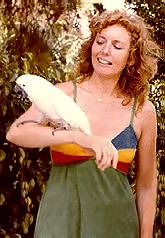
">
">
">
">
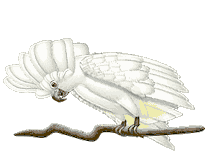

Where are we today? As most collections do, ours grew and it became apparent more suitable quarters were needed. We selected the area of Cocoa, Florida, which is on the east coast near the Kennedy Space Center, acquiring land that is agriculturally zoned. In l983, construction was completed and our breeding collection was reestablished in their new home where it continued to grow to 130 pair occupying 5 buildings. |
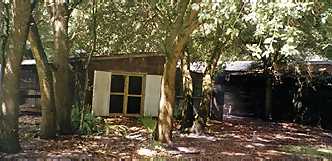
">
">
">
">
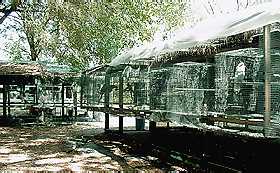
Over the past several years we have been forced to recognize we must prepare for the reality of retiring from the demands of aviary maintenance and the energy needed to provide the best possible care to the birds. Consequently we have chosen to gradually reduce the size of the collection and have found new homes for many of our pairs primarily choosing to breed only the larger species. The collection is currently at about 30 pair many of which are 2nd and 3rd generation babies that were bred and raised here. (A link to the page listing our breeder birds currently available for purchase can be found on our Home page.) |
">
">
">
">
Being in Florida, we are fortunate to be able to produce a variety of citrus, banana, papaya, some vegetables and are growing macadamia nuts for the Hyacinths. |
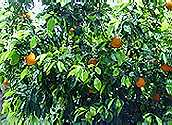
">
">
">
">

What diet do we provide our collection? Each day a homegrown spouted mixture or a cooked corn, bean and brown rice mix is prepared which accounts for 30% of the diet. This is combined with a Safflower/dried fruit/dried veggie Mix (30% of the diet), Parrot Mix (15% of the diet) and Breeder Pellet (15% of the diet). In addition, each day one or two fresh fruits and/or vegetables are alternately added to the mix. In shell mixed nuts are also fed. Occasionally frozen mixed vegetables are chosen. Special dietary needs of certain species are taken into consideration at feeding time such as for the Galahs who require a diet low in fat. They receive no seed (except for an occasional sprinkle as a treat) and additional sprouts, fruits and veggies. In order to minimize the problem of obesity and insure the entire variety of what is fed is consumed, everyone is strictly rationed on the amount they are fed and as a supplement all receive a daily sprinkle of a mixture of wheat grass, alfalfa leaf, spinach, beet, carrot and garlic powders. |

Do Hyacinths require a special diet? Hyacinth Macaws in the wild have a diet very high in fat and in captivity the majority of their diet consists of Macadamia and Brazil nuts although they are fond of all types of mixed nuts. They also have coconut, papaya, banana, melon and a full assortment of other fruits and vegetables which they consume small amounts of compared to the nuts. Some will choose to eat seed and pellets on occasion. For a healthy, happy Hyacinth, it is essential their special dietary needs are met. |

Whose babies do we sell? Ours is a closed aviary -- that is, it is our policy to sell only babies that are bred and raised at our facility. Our greatest production is cockatoos and macaws which are available most of the year -- our other various species being available on a more seasonal basis. Cockatoos, because of their loving, affectionate nature have always been my favorite and the Hyacinths fit into that category also because they are actually a very large cockatoo in a macaw suit!! "Apricot" was our first Moluccan baby. He was hatched in l983 and has been a proud Daddy since he was 5. Each day we are greeted with "Hi, Baby -- Hi, Apricot" until he is given his personal peanut. |
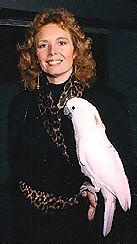
With "Apricot" |

Do we artifically incubated or allow parents to raise? There is no substitute for Mother Nature so any pair that will sit their eggs and feed their babies are allowed to do so. However, the majority of our eggs are artifically incubated and hatched and hand-raised from day one. Those chicks that are hatched and fed in the nest are brought into the Nursery from five to ten days of age. We use both the Grumbach and Brinsea Incubators. |
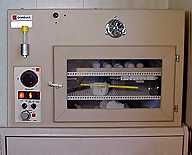
">
">
">
">
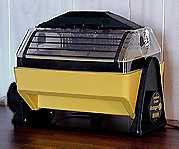
">
">
">
">

Our standard Nursery procedures: The development of each baby is noted daily with their weight recorded prior to the first feeding of the day as well as the amount of formula fed for that feeding and monitored in comparison with statistics kept on all prior hatches of that species. Periodic bacterial and fungal cultures are completed in-house under the supervision of our veterinarian. We syringe feed and all of our babies are closed banded. |
Our Brooders are wooden cabinets housing aquariums 10 to 20 gallons in size. They are thermostatically controlled with waterbed heater elements, the heat source being light bulbs. |
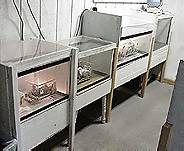
">
">
">
">
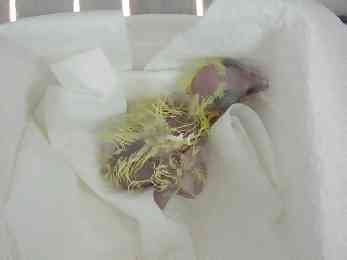
">
">
">
">
Newly hatched chicks are maintained at 95 to 97 degrees F. and fed at 60 to 90 minute intervals from 8 a.m. to 11 p.m. with at least 1 feeding during the remaining night hours. One of three handfeeding formulations are selected for use depending on the species to ensure proper nutrition based on differences in the needs of the various species. |
As they progress, they graduate to larger containers, lower temperatures and a feeding schedule of 3 hour intervals. |
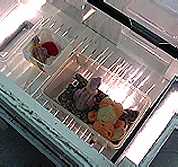
">
">
">
">
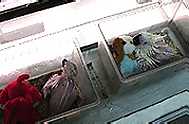
">
">
">
">
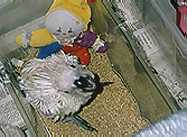
">
">
">
">
When their feathers are opened sufficiently, they are ready to leave the brooders for their next stage in tubs. At this point they are generally on 4 feedings a day and offered sprouts, seeds, pellets, millet, fruits and veggies. |
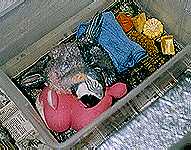
">
">
">
">
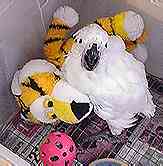
">
">
">
">
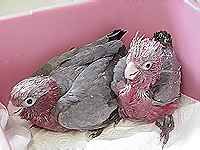
">
">
">
">
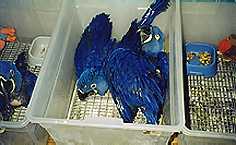
">
">
">
">
This Hyacinth baby climbed from his tub into his sibling's -- time for a cage!! |
The next step is to cages where they learn how to perch. They have started investigating "real" food and their feedings are soon reduced to 3 times a day. Every baby individually determines the number of times a day they are fed. Their feedings are reduced only when they continually refuse formula and show they are indeed beginning to consume the assortment of weaning food that is offered. |
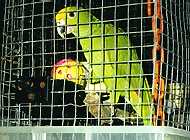
">
">
">
">
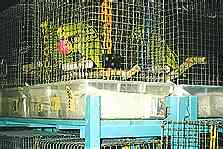
">
">
">
">
Perching is an acquired skill -- but in the meantime, perches have other useful benefits! |
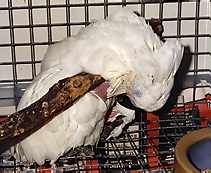
">
">
">
">
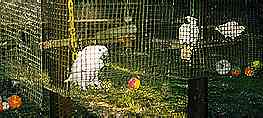
">
">
">
">
At 2 feedings a day, during the warm months of the year, they relocate to cages on a large screened porch area where they have more opportunity for group playtime. |
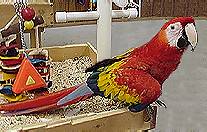
">
">
">
">
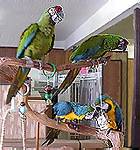
">
">
">
">
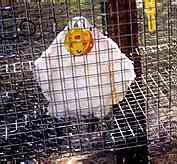
">
">
">
">
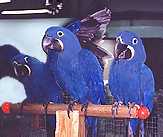
">
">
">
">
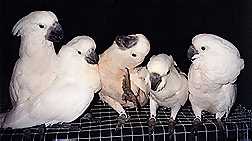
">
">
">
">

Our prices: We are happy to share information about behavior traits of different species and quote our retail price to anyone who is interested in acquiring a weaned pet bird. Unweaned babies are only available to those individuals who are located close enough to our facility to learn handfeeding and feed their baby during their visits until they are completely comfortable with the technique. An unweaned baby generally does not go to its new home until it is down to a minimum of 2 feedings a day. Weaning can be a very stressful time for a baby bird and is very often more stressful for the human companion. Being close to the breeder or pet store where the baby was acquired who can answer questions and provide guidance is highly recommended. Deposits are non-refundable and are required to reserve a baby at the time the baby is 3 weeks old with payment in full due prior to shipping. We do not accept deposits on babies younger than 3 weeks or on eggs. Deposit and final payment can be made with money orders, cashier's checks or bank wire transfers. Personal checks are also accepted but require sufficient time to clear prior to shipment. COD shipments are not available. DNA sexing is determined for all Hyacinth babies between 5 and 6 weeks of age and is included in their price. DNA sexing for all other species is not included in their price, the cost is generally between $20 and $25 if you choose to have that test completed. We restrict our wholesale sales to licensed businesses and do not compete with our accounts by selling wholesale to the public market which is why we do not advertise in Bird Talk or other similar avian magazines. If you are a licensed pet store, please email us your name, your store's name, street address and telephone and we will be happy to mail you our letter of introduction, Wholesale Price List and present availability. |

What is our guarantee? Our many years in the business of aviculture serve as testimony to our dedication to provide healthy babies to our customers both for their satisfaction and the long-term wellbeing of each baby. We guarantee all babies at the time of shipment to be healthy and free of any pre-existing disease including pathogenic bacterial, fungal or viral infections as well as congenital abnormalities which would compromise their health. Any diagnosis of an unforseen pre-existing condition which manifests itself subsequent to shipping must be made by a licensed Avian Veterinarian and notification made to us within 24 hours of such diagnosis. Your Veterinarian's written report which must include documentation of the leg band identification, clinical laboratory tests and results must be submitted to us for review and concurrence by our attending Vet. A replacement will be made for a pre-existing condition resulting in the loss of a baby. Removal of our leg band will void all guarantees. The health of our babies is a responsibility we take very seriously. |

What about shipping? We ship out of Orlando International and will ship to any U.S. destination that has direct flight service. Live animals are secured in the Cargo area of the airplane which is pressurized and maintained within a few degrees of the passenger cabin. Shipments requiring connecting flights are given special consideration depending on seasonal temperature restrictions at place of departure, transfer and destination all of which can restrict the time of year and time of day shipments can be scheduled. Even if it means a longer drive for pick-up, a direct flight is always the preference. Cost of shipping, crate, and Health Certificate (if required) are at the expense of the buyer. Depending on the airline used, carrier sizes and total weight of the shipment, the charge for shipping ranges from $100 to $150. These costs are representative of current average charges and are subject to change. It is always best to confirm the estimated shipping costs at the time of each purchase. Cost of carrier is dependent on the size required for the type bird being shipped and ranges from $15 to $75. We use premanufactured kennel-type carriers that are approved for shipment of exotic birds by the International Air Transport Association (IATA) Live Animal Regulations, adopted by U.S. Fish and Wildlife Service and the Convention on International Trade in Endangered Species (CITES), and can later be used to transport your pet with you as the need arises. Each carrier is prepared with suitable absorbent bedding as well as generous amounts of fresh food including fruit and vegetables which provide needed moisture should delays be experienced. Several days prior to shipment, babies are placed in their carrier for varying periods of time so they can become accustomed to their travel accommodations and make their trip with the least amount of stress as possible. Health Certificates are available and are optional except for those states and certain airlines which do require they be completed. The cost for a Health Certificate will be the actual amount charged by the Veterinarian preparing the Certificate. Their fee for this service is subject to change and will need to be confirmed at the time of purchase. Once the destination and day of shipment have been selected by the customer, a schedule of available flights is secured from the airlines so a mutually convenient time can be established. The reservation and all required documents for shipment are completed by us and you are provided with all flight information including the Airway Bill number prior to the day of departure. Each shipment is accompanied with an Invoice securely attached to the top of the carrier which includes hatch date, closed band number and all other information relative to that baby. The U. S. Postal Service regulations do not permit shipment of exotic birds from our area. |
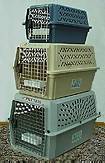
">
">
">
">

References? We have long-term established accounts in several states and would be happy to provide you with references should you so desire. |

Please feel free to contact us either by email or telephone if you have any questions we can assist you with. We hope you have the opportunity to view our other pages and enjoy them as much as we have enjoyed making them. Links to them are located on our Home page. The photos we present were all either taken by us or are of our babies taken by their adopted human companions who graciously shared them with us. We especially want to thank all those who have provided many of the graphics and animations you will see here. Have a great day and visit often!!! Sincerely, Joy Dykes and all of our Feathered Friends |
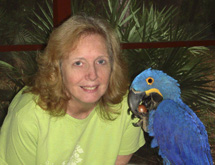
">
">
">
">

Please Sign Our Guestbook |


11/21/09 |

